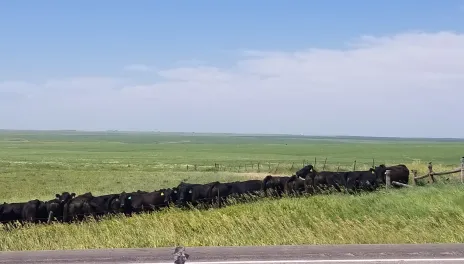Fly control for cattle
There is something about cattle that attracts flies. Many times in the summer you will see a cow herd in the corner of a pasture, closest to the prevailing wind, fighting flies.
Providing relief from flies takes planning and multiple approaches. A one-time control with an insecticide may reduce the population for a short time. Unfortunately, however, more flies will hatch and become aggravating replacements.
Adding a larvicide in feed or mineral will reduce horn flies, but not all flies. Horn flies tend to be the most bothersome since they bite and feed on blood. As you might guess from their name, they spend most of their time on the head, shoulders, and back of cattle.
There is a negative economic impact that comes with excessive fly pressure: weaning weights will be lower when fly concentrations are greater than 100 flies per cow’s side (or 200 flies total).
Using fly control in mineral needs to begin before or when cattle are turned out to pasture. The goal is to keep fly populations at a low level throughout the summer, and that can only be accomplished by early and continued control throughout the season. Including fly control measures in feed prevents flies from reaching adult stage.
Once flies reach adult stage, there are several control measures available: treated ear tags, pour-ons, dust bags, oilers with insecticide, foggers, and sprays. Unfortunately, repeated applications throughout the summer are needed for control.
Like many creatures, flies can develop a resistance to insecticides. Changing the active ingredient when the current insecticide loses effectiveness is necessary. Be aware that changing insecticides too early or using two types of insecticides at the same time could provide better control, but might allow flies to develop resistance to both insecticides.
Controlling flies to keep a low population is best. Don’t wait until hundreds of flies are on the cattle before deciding it’s time to declare removal.
Karl Hoppe, Ph. D.
Karl.Hoppe@ndsu.edu
Extension Livestock Systems Specialist
